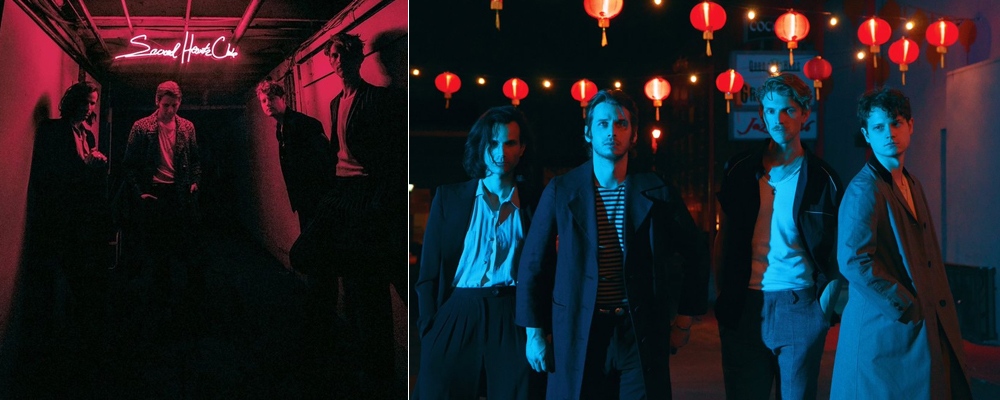Foster the People Rediscover Their Subversive Bliss on ‘Sacred Hearts Club’
Zack Hillman
When assessing the music of Foster the People, it’s impossible not to acknowledge the pernicious edge they give their indie pop songs. After all, this is a band whose breakout, “Pumped Up Kicks,” describes a school shooting with whistling throughout the chorus. Their 2011 debut “Torches” had a sinister smile plastered on its proverbial face, finding gleeful abandon and demented humor in tracks like “Helena Beat” and “Don’t Stop (Color on the Walls).” For 2014’s sophomore album “Supermodel,” ringleader Mark Foster wrote from a stance of consumerist disillusionment, likely brought on from the unlikely smash success of their debut. He attempted to add more grit with an acoustic guitar-driven sound and made no effort to hide how jaded he’d become in only a few years. If the first album was macabre pleasure, this was cynical bile. To add insult to injury, his treatise against the hollow machinations of stardom was a lackluster effort that didn’t manage to stand out from the crowd of imitators he had helped inspire.
Audiences will be pleased to know that 2017’s “Sacred Hearts Club” has brought the joy back to their subversive style, a move that should help them reclaim some of the territory snatched up by the Fitz and the Tantrums and Neon Trees of the world. The record loudly trumpets its allegiance to uptempo indietronica right off the bat with “Pay the Man” and “Doing It for the Money,” two of the three tracks they released earlier this year on “III.” If that EP gave fans hope that they had left behind pessimism in favor of twisted “Torches”-style catchiness, let the Stockholm syndrome ‘n’ suicide anthem “Loyal Like Syd and Nancy” stand as evidence that the band is reinvigorated and, what’s more, discovering exactly who they are on this new LP.
Focus is an important factor in the album’s success, and it comes from the band moving their EDM influences from the background to the forefront. “Torches” sounded like a rock record that was mixed and arranged on a Roland sampler, giving it a cheesy charm that audiences and critics couldn’t resist. “Supermodel” had much the same feel, but struggled to establish “street cred” with masturbatory attempts to incorporate musique concrète and shoegaze. Perhaps Foster was trying to address the criticisms that will necessarily haunt a non-guitar-centric rock band, but their new album embraces the potential of their sound instead of hiding from it. In fact, you won’t hear a guitar “doing guitar things” until the pile driving rocker “Lotus Eater.” Furthermore, the aforementioned lead-off single “Loyal Like Sid and Nancy” has more in common with “Clubbed to Death” than “Anarchy in the U.K.” The group has graduated from their battery-powered sampler days (and their concerns about the naysayers) and fully embraced the potential of their DAWs, allowing them to meticulously arrange every detail.
The end result is a fun-loving, flowing record where every element sounds perfectly ordered without sacrificing the element of surprise. On “Harden the Paint,” glittering synth arpeggios and autotune vocal harmonies glide over glitched-out stabs and keypads. This is still the same band, but it sounds like they’ve invited Calvin Harris to join. It’s tempting to attribute the additional gloss to producers Josh Abraham (Justin Beiber, Carly Rae Jepsen) and Lars Stalfors (Purity Ring, Cold War Kids), but Foster himself seems like he’s in the driver’s seat the whole time. He’s so confident that he makes nods to rock legends, incorporating Beach Boys harmonies on “Static Space Lover” and embracing solo era-Robert Plant crooning on “Time to Get Closer.” Instead of the random influence mash ups that characterized past efforts, each dash of color feels purposeful and inspired, while Foster’s iconic references read like a submission for inclusion in the songwriters’ pantheon. And, doubtless, he’ll have a strong case when all is said and done.
If the album has a flaw, it’s that it falls just short of being the full-fledged comeback that Foster the People might have been looking for. To be sure, anyone who’s been along for the ride for the better part of a decade will love the sunny arrangements, lushly detailed production, and consistently strong songwriting. This is the sound of a unique talent fully in control of his own skills and establishing his voice as a producer and songwriter. But for all his technical precision, Foster doesn’t craft anything quite as immediate as the unrestrained singalongs that populated the group’s debut. Thus, Foster the People find themselves in the lamentable position of perfecting their craft and failing to meet their own standard in the exact same instance.
“Sacred Hearts Club“ is available on Apple Music July 21.

